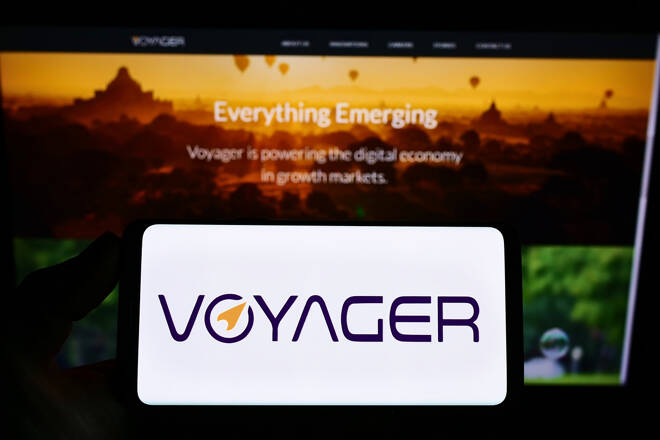Advertisement
Advertisement
Crypto Lender Voyager to Return $270 Million in Customer Funds
By:
Judge Michael Wiles of the U.S. Bankruptcy Court in New York has ruled that Voyager can return customer funds
Key Insights:
- U.S. bankruptcy Judge Michael Wiles has granted approval for Voyager to return $270 million in customer funds.
- Last month it was revealed that Voyager held custody of $1.3 billion in customer crypto assets.
- Voyager has confirmed that there are as many as 88 interested parties keen to bailout the company from its financial troubles.
It comes as welcome news that bankrupt crypto brokerage firm Voyager Digital has secured approval to return $270 million in customer funds, settling one of the largest obstacles it has faced since filing for Chapter 11 bankruptcy.
More specifically, Voyager filed for bankruptcy a week after suspending withdrawals, trading and deposits on its platform.
Customer Funds
The Toronto-based firm, which is estimated to have more than 100,000 creditors, somewhere between $1 and $10 billion in assets and liabilities worth the same value, received the approval from U.S. bankruptcy Judge Michael Wiles who is overseeing Voyager’s case.
Wiles ruled that the company provided “sufficient basis” to support its contention that customers should be allowed access to the custodial account held at Metropolitan Commercial Bank (MCB).
While Voyager has received approval to return $270 million in customer cash, the question remains as to whether crypto assets on its platform belongs to customers or the company undergoing bankruptcy proceedings. It could be the case that this decision will fall onto presiding Judge Wiles.
Last month it was revealed that Voyager held custody of $1.3 billion in customer crypto assets spread across 3.5 million active users. According to a court document, roughly $100 to $200 million was held in these accounts for the benefit of customers and not held in Voyager’s bankruptcy estate.
Voyager’s case had been pending a reconciliation and fraud prevention process due to the potential risk of non-eligible customers fraudulently claiming cash from MCB. It has not yet been specified how customers will receive their funds, however one option would be to allow other companies to bid for Voyager’s assets.
Bailout
During a hearing presentation this week, Voyager confirmed that there are as many 88 interested parties keen to bailout the company from its financial troubles. As well as being in “active discussions” with a number of interested parties, it was revealed in its filing that Voyager entered into confidentiality agreements with 37 potential buyers.
One of the most high-profile bids came from Alameda Ventures and FTX last month. Alameda Ventures had proposed to buy all of Voyager’s assets and outstanding loans in order to offer early liquidity to customers through the FTX U.S. exchange.
FTX’s CEO Sam Bankman-Fried argued that the move would give Voyager’s customers the ability to access assets that would otherwise be locked up for a significant time as the case was navigating through bankruptcy court.
However, lawyers representing Voyager labelled FTX’s proposal as a “low-ball bid” that was designed to generate publicity and did not add value to customers. Their reasoning for this was that Alameda Ventures proposed a liquidation where FTX would have served as the liquidator, which could have potentially mired how the value of Voyager’s cryptocurrency assets and loans was determined.
As it currently stands, the company’s closest proposal to a restructuring plan would distribute funds to customers in some combination of cash, their cryptocurrency holdings, proceeds from the Three Arrows Capital recovery, common shares in the newly reorganised company and Voyager tokens.
About the Author
Mohadesa Najumiauthor
Mohadesa Najumi is a British writer who has worked within crypto, forex, financial technology, and the stock market industry. Mohadesa received her MSc in Political Science and International Relations at the University of Amsterdam.
Advertisement
